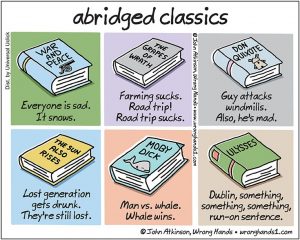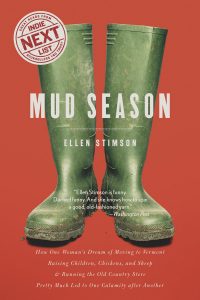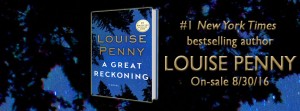Abridged classics
A Book Barmy reader (yes, I have a growing number of loyal readers ~ who knew?) noticed my efforts to plow through some of the classics ~~ and send me these.
Thanks, there’s nine titles I can cross of my list.
P.S. I just finished Louise Penny’s newest – due out August 30th. My advice — plan to call in sick to work, and run, do not walk, to your nearest independent book store.
Lisa Scottoline
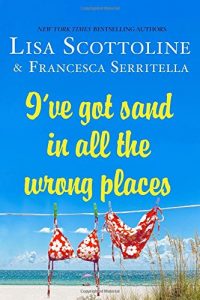 If you’re a follower of Book Barmy, you may have surmised I’m not always a high-brow reader. Yes, I read important books and am working through several classics (Trollope you’re killing me, buddy), but some evenings I just want to zone out, with some plain light-hearted fun.
If you’re a follower of Book Barmy, you may have surmised I’m not always a high-brow reader. Yes, I read important books and am working through several classics (Trollope you’re killing me, buddy), but some evenings I just want to zone out, with some plain light-hearted fun.
You may know Lisa Scottoline as the Edgar-Award winning author of twenty plus NY Times bestselling crime novels. I’ve never read any of those, instead I know her for her series of humor books. I’ve Got Sand In All the Wrong Places marks the seventh in this very funny series.
I find it impressive that Ms. Scottoline can write both page-turning legal thrillers (she practiced as a lawyer before becoming a writer) as well as this series of hilarious and witty books. The material for these laugh-out-loud books derives from a Sunday column that Ms. Scottoline and her daughter, Francesca write for the Philadelphia Inquirer. Each short chapter is a column from the paper written separately by either mother or daughter and each year a new book is derived from the year’s columns. (Obviously Ms. Scottoline is not only a best-selling writer, she is also a canny business person.)
Ms’s. Scottoline and Serritella are strong, funny women who take on the subjects of daily life: love, dating, sex, no sex, pets, food, clothes, writing, traveling, health, hair, and more. No subject is off limits.
Ms. Scottoline’s love of family is apparent on every page and cause for humor as she describes her relationships with her mother, brother, and daughter. Mother Mary (her dearly departed mother) was often the funniest subject matter.
Mother Mary is out of the hospital, and recovery lies ahead.
For the hospital.
Her honest love of her menagerie of dogs was especially funny in her book Why My Third Husband with be a Dog ~ on her Golden Retrievers:
Here is what the Goldens are like: fun, easy, friendly, happy, and loving, on a continuous loop. You could have three Goldens in the room and not know it. They love to sleep. They love everything. Honestly, I kept adding Goldens because I forgot they were there. You could be sitting in a roomful of Goldens and think to yourself, “You know, we need a dog”.
However, I find the best thing about Ms. Scottoline’s humor is her normal-ness and self depreciation. Graduating from a top law school with honors, she decided to become a crime novelist and succeeded. Got give that some respect.
Anyway, my head was full of these thoughts the other afternoon, as I was hurrying in a downpour through the streets of New York City, there to take my author photo. I know that sounds glamorous and it would be if I were ten pounds lighter and ten years younger, but take it from me, the best fiction in my books is the author photo.
This latest volume again is both humorous and poignant as it deals with daughter Francesca’s life in New York city which includes a brutal assault. But like the other books I found it funny, warm, down to earth, and, at times unpredictable
There’s an essay on the holiday season and how in the past, Ms. Scottoline found it all too stressful, and resorted to holiday shopping on-line. The news of a bookstore closing, has her vowing to shop in actual stores — especially bookstores (hail comrade!) – and that maybe it’s supposed to be stressful.
It may be obvious as an abstract matter, but I realized that many other types of stores could go belly-up, if I keep shopping on my butt. So I taught myself a lesson: Vote with my feet. If I want to live in a community that has bookstores and all other kinds of stores, as well as local people happily employed in those stores, I have to out and buy stuff. I’m putting on my coat and going shopping . I look forward to the cranky shoppers, the waiting in lines, and the fighting over the parking space. And I’m wishing you and yours a happily stressful holiday.
The terrifying CNN storm predictions for New York City has Ms. Scottoline texting and calling her daughter in a panic:
I became Hurricane Mom. First thing in the morning, I called her, vaguely hysterical:
“Honey, did you see the TV? There’s going to be a big storm!”
“Don’t worry, Mom,” Francesca answered, too calmly for my taste. “What are you doing? Did you go food shopping?” “I’m working. I don’t need to go food shopping. I have food in the fridge.”
“But do you have canned goods?”
“Canned goods?” Francesca asked, chuckling softly. “What are you talking about?” “Canned goods, canned goods!”
Francesca replied, “I think I have a can of beans…
“You need more beans, right away!”
“Why, what are you talking about? Please, you need to calm down.”
“I can’t! You need canned goods in case of a power outage! It’s going to be a giant, epic, historic, emergency, monster blizzard storm!”
“They always say that.”
“But they’re right! This is CNN talking! Wolf Blitzer!”
“I’m OK.” “No,you’re not! You’re going to DIE!”
So you know where this is going. Drama ensued. Voices were raised. Things were said. Tears were shed. Mistakes were made.
Bottom line, there was a lot of passive voice happening, which is never a good thing, whether it’s a federal government or a mother-daughter relationship.
But it had a happy ending. There was no epic winter monster blizzard storm. I apologized to Francesca for terrorizing her. Francesca apologized, happy that I loved her enough to terrorize her.Meteorologists apologized for their predictions.
As for Wolf Blitzer, we’re not speaking to him.
I highly recommend having this volume or any of the wonderfully-titled humor books by your bedside to dip into just before going to sleep.
Take it from Book Barmy, go to sleep with a loved one’s kiss and, after a few life observations from Lisa and Francesca — with a smile.
A digital review copy was provided by St. Martin’s Press via NetGalley.
Ruth Reichl
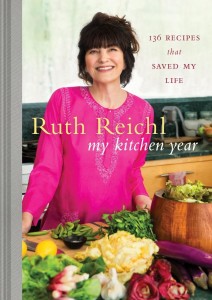 My Kitchen Year ~ 136 Recipes that Saved My Life by Ruth Reichl
My Kitchen Year ~ 136 Recipes that Saved My Life by Ruth Reichl
I’d been lusting after this book since it first came out. I was hoping it would come into the the bookstore where I work (and have a discount), but it never did. My friend and fellow foodie, Susan, already had the book and was full of yummy descriptions. I told her I had to have it and was just going to buy it – expense be damned. Then, a few days later, Susan announced she had come into an “extra” copy which she would give me. (I secretly suspect my dear friend actually bought it for me, but we’ll go with her story.)
From the book’s publicity blurb:
In the fall of 2009, the food world was rocked when Gourmet magazine was abruptly shuttered by its parent company. No one was more stunned by this unexpected turn of events than its beloved editor in chief, Ruth Reichl, who suddenly faced an uncertain professional future. As she struggled to process what had seemed unthinkable, Reichl turned to the one place that had always provided sanctuary. “I did what I always do when I’m confused, lonely, or frightened,” she writes. “I disappeared into the kitchen.”
Happily this is more than just a cookbook, although it is packed with (as the title states) 136 hunger-inducing recipes — what makes My Kitchen Year shine is Ms. Reichl’s personal writings, snippets from her journal, and musings on food interspersed between the recipes. She tells of the final weeks closing up the magazine, packing her office. Of going into Chinatown with her beloved fellow staffers for a final lunch at a favorite restaurant. And how can you not have a craving for chocolate cake when reading this passage?:
I needed an antidote to the poison of self-pity. What I needed, I decided, was to bake a chocolate cake. I emailed a few friends, asking them to tea. Why a cake? Because the precision of baking demands total attention. Why this cake (The Cake that Cures Everything)? Because the sheer size of it makes special demands. But most of all, because it is impossible to hold on to gloom with so much chocolate wafting its exuberant scent into every corner of the house.
Most everyone was saddened when Gourmet magazine suddenly stopped publication (I was a subscriber for over 15 years and am still in mourning) but, apparently, none of us were as astonished as Ms. Reichl, herself. She knew nothing of the decision and had, in fact, personally supervised the December issue which, sadly would never make it to press. How I would have liked to see that last issue. She ruefully describes how each magazine issue would have had multiple covers of beautifully photographed Christmas cookies.
Reeling, she escapes to her home in upstate NY …
I longed for the feel of knife in my hand, the heft of water splashing into a pot. Yearned for the joyous sizzle, burble, and hiss that are the ever-changing soundtrack of the kitchen. I missed the daily transformations: fruit ripening, dough rising, bread toasting into golden slabs. I’d always thought of these elemental pleasures as minor diversions, but now I understood they they’re the glue that holds my life together….in a world filled with no, it is my yes.
This long-time food writer and one time NY Times restaurant critic has made a career of haute cuisine. But here Ms. Reichl shares her appreciation (and recipes) for simple meals, often made with farmer market obtained fresh ingredients. She has eaten the world’s best food in the finest restaurants, yet upon bringing home spring’s first asparagus, she cooks it quickly, drizzles it with fine olive oil and eats the spears by hand while still standing at the stove.
Ms. Reichl uses food as a gift of love, not only for herself, but also for her friends and family. Whereas before, she would have gone to someplace fancy with lowered voices and expensive menus, now she entertains at home, serving her home-made meals around her table where everyone happily lingers, talking until the wee hours. She looks around and feels at peace and finally, at home.
In terms of a cookbook, the recipes are wonderful. Not overwritten with just the right amount of instruction. There are plenty of Asian inspired entries, but nothing too complicated. I just counted and I have pencil checked at least 25 in the index to try – Fresh Apricot Pie and Food Cart Curry Chicken are in the plans for the near future here in the Book Barmy kitchen.
I have read all of Ms. Reichl’s books (list HERE) and they range from her early childhood with a mother who was a horrible cook to one of my favorites Garlic and Sapphires which recounts her days as a restaurant critic (which often required donning various disguises). During the year after Gourmet, she also wrote a novel called Delicious – a fun plot which mimics her own experience — namely, the closing of a food magazine and the poor writer who stayed behind to answer all the on-going readers letters.
You don’t have to be a hard-core foodie, or a past subscriber to Gourmet Magazine to enjoy any of Ms. Reichl’s books. But, if you appreciate good cooking and delicious meals, do go ahead and treat yourself to your own copy of My Kitchen Year.
(Thank you Susan)
Mud Season by Ellen Stimson
New England is a beautiful but often harsh place to live. Husband and I met and married there, but when grad school and a job offer whisked us off to gentler climes, we never looked back.
My sister and her husband are made of sturdier stuff. They live in the New Hampshire woods by a creek. As native New Englanders, they flourish through all the seasons; the crisp autumn days, the long snow-bound winters, the clouds of black flies in the spring, the hot sticky summers, and even the muddy inbetween season. During the long winters, they often loose power (which means no pump, so no running water), so they bring in buckets of water from the creek for flushing and to heat on their wood stove for washing. They don extra layers of clothing, bring in firewood, light candles and wear headlamps –calmly making do until power is restored — in other words — They Forge On.
Forging on is just what Ms. Stimson does in Mud Season — (aptly subtitled How One Woman’s Dream of Moving to Vermont, Raising Children, Chickens and Sheep, and Running the Old Country Store Pretty Much Led to One Calamity After Another).
This memoir, which the author admits is only 78% true, tells the story of a St. Louis family who move to Vermont, after falling in love with it on a vacation. Ah yes, you may be thinking, another one of those How-to-move-to-the-country-and-have-an-idyllic-life stories.
Well, not really — actually, not at all.
Ms. Stimson is snarky, sarcastic, and very, very funny. With her family in tow, she doesn’t so much as move into the small town of Dorset, she invades it … and colossal failures ensue.
They spend an outrageous amount of money renovating their old farmhouse using out of state contractors. They go on to purchase chickens and goats – knowing nothing about their care. Their son is acting out in the local school and after a run in with the administration, they take on home schooling which doesn’t go well. (A science lesson results in a red-dyed pond and a subsequent police investigation.)
Ms. Stimson decides to open what she calls a “quaint country store” and caters to the tourist’s Disney version of Vermont – even charging $4 each for peaches from New York (gasp!). When the tourists leave, so do their store sales.
You’ll simultaneously laugh and cringe at Ms. Stimson’s cavalier attitude and misguided good intentions. This is no gentle, “let’s take things slowly and get to know the locals” approach — this is forging on with misguided plans of making a living in the Republic of Vermont with profoundly ill-advised decisions.
The book is smattered with wisecracking footnotes which reflect the author’s wry self-depreciation – her afterthoughts on how she could have done things differently, but she just can’t seem to learn. Her irresponsible optimism blinds her judgement and she just keeps forging ahead.
When Ms. Stimson does try to fit in, it results in yet more mishaps. She dresses up with scarf and heels for local festival and later reflects on the standard Vermont uniform…
…khakis and sensible shoes with a blue chambray linen blouse and some version of fleece on top. No lipstick. LLBean. Steady and reliable.
She gamely agrees to open her house for the spring home tour, forgets the date and is found out back mucking out the chicken shed — with a very messy house.
So I did the only real thing that I ever could do. I walked up the hill, took off my poopy gloves, offered my cold, chapped hand, and said “Hello, won’t you please come in?”
A beautiful waterfall only a 10 minute walk from her house brings her quiet joy and she lovingly describes the smell of each season. And so you begin to believe she’s going to make it — one can only hope she’ll start to get it. Then, during the often freezing mud season, the unpredictable, bighearted Ms. Stimson adopts two orphaned lambs and keeping them warm indoors, seems surprised when they destroy their beautiful renovated house. It seems they won’t be house trained.
Mud Season is an outlandish, funny read until the last few chapters, when the family’s dreams and reality collide into bankruptcy, the closing of the (now called) “horrible” quaint country store, and having to take jobs out of state with long commutes.
Mud Season may have been written more for humor than accuracy but if even half of it is true, here’s a cautionary tale. A tale of how not to barge into a small Vermont town, how not to become friends with the locals, how not to to be part-time farmer, home schooler or a quaint country store proprietor. But it’s a journey that will have you laughing the whole way.
Ms. Stimson has written a follow up book called Good Grief – Life in a Tiny Vermont Village – not sure I can take any more of her foolish antics, no matter how funny.
All the Light We Cannot See by Anthony Doerr
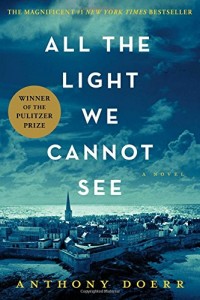 Last night, I closed All the Light I Cannot See and asked myself, what the heck happened to this beautiful novel? (OK I didn’t say heck, just trying to keep it clean here at Book Barmy.)
Last night, I closed All the Light I Cannot See and asked myself, what the heck happened to this beautiful novel? (OK I didn’t say heck, just trying to keep it clean here at Book Barmy.)
This WWII blockbuster opens with two riveting story lines. Werner, an orphan German teen is recruited by the Nazi’s for his invaluable radio engineering skills, and Marie-Laure, a blind French girl – separated from her adoring father in war-torn France. Right from the beginning, the reader knows that the lives of these two potentially fascinating characters will intersect.
The novel also has some captivating scenes, all beautifully written. There’s Marie-Laure reading aloud from her braille edition of 20,000 Leagues Under the Sea, there’s the ominous agenda inside Werner’s exclusive Nazi training school, and then, if you’re like me, you’ll hold your breath as messages are passed along, hidden in freshly baked bread, and then secretly broadcast from a short-wave radio hidden in the attic of a crumbling house perched on the edge of the sea. Everything is there — all the elements of a well-written and exciting WWII adventure.
And so you settle in, cup of tea in hand and eagerly start reading…and reading…and reading — through 178 chapters. Yes, you read that right — 178 chapters!
Therein lies the first problem — 178 short chapters, many only a few pages, which jerk the reader back in forth in time, often with no clue to the year. The choppy chapters and abrupt time jumps are not only confusing, they actually prevented me from really sinking into the story. One reviewer, knowing that Mr. Doerr is a much better writer than this, surmised his editors insisted on shuffling the timeline. The format did feel gimmicky and like an afterthought. I’d go even further, I think those same editors also insisted on chopping the novel into short chapters to cater to today’s 140-character-tweet-text-snapchat-attention-span readers (That just wrote itself in the throes of my rant – like it?).
Now we come to the second problem, All the Light We Cannot See starts out beautifully written and compelling, but then it just seems to fall apart — rather it just never comes together. Werner’s and Marie-Laure’s paths, while coming teasingly close, never really converge. And when they do finally intertwine, they are only together for 10 pages towards the end. Then fast forward 30 years and the book ends not with a bang but with a whimper (my apologies to T. S. Eliot).
The novel won Pulitzer Prize, earned many glowing reviews and many weeks on the bestseller lists. Perhaps I missed something magical in my reading of this book. Maybe it was my mood. Whatever the reason, I was underwhelmed and sadly disappointed upon finishing this novel.
A digital review copy was provided by Scribner via NetGalley.
Louise Penny is back
I just received an advanced readers copy of this – so excited.
Thanks to Netgalley and the St. Martin’s Press.
I know you’re all extremely jealous, but in the meantime, please enjoy Ms. Penny being interviewed by her long-time friend at the CBC.
I have two other books going, but I may have to throw them aside for this… stay tuned …


